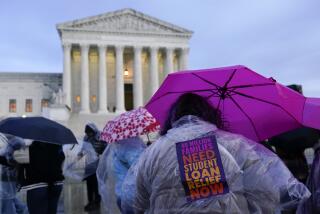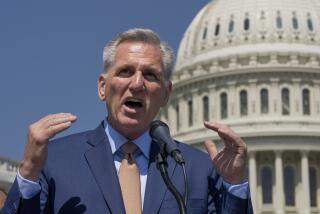Brazil May Halt Its Debt Payments
BRASILIA, Brazil — Finance Minister Mailson Nobrega said Monday that under a new plan designed to end the country’s economic crisis, Brazil might again have to suspend interest payments on its debt if foreign currency reserves should reach a critical level.
Nobrega was briefing reporters on the sweeping anti-inflation plan launched by the government Sunday night.
“It is not an objective of the plan to suspend interest payments. . . . This will happen only if the reserves of the country reach a critical level,” he said.
Asked what the government considered a critical level, Nobrega broke into English to reply “Top secret.” Brazil, the Third World’s biggest debtor, owes $115 billion.
Another payments moratorium would deal a severe setback to U.S. banks, which have only recently bounced back from the effects of Brazil’s February, 1987, suspension of interest payments to commercial lenders. The payments moratorium also was triggered by a severe economic crisis.
President Jose Sarney announced Sunday an indefinite price and wage freeze and a currency devaluation of 17% to put the brakes on inflation, now estimated at around 1,000%. He said it was the toughest fiscal policy in Brazilian history and warned the country that without the new measures inflation could rise to 1,500%.
Brazil’s two main trade unions said Monday that they were considering a general strike to protest the new plan. Leaders of the Workers’ Confederation and the General Workers’ Confederation said they were awaiting the results of a study on the plan’s impact on workers’ wage before starting a national walkout.
Inflation last year was a record 934%. Two previous attempts at beating inflation by price freezes, launched in 1986 and 1987, both failed dismally.
Nobrega, who took office a year ago, began making debt payments late last year after an accord was reached to end a debt moratorium declared in February, 1987.
He stressed that Brazil would not return to a confrontation with bankers. But he also emphasized that the country needed economic growth.
“We do not have the least intention of returning to the attitudes of confrontation that Brazil had in the past, but if Brazil does not return to growth we could have serious problems in the social and political domains,” he said.
“The foreign debt is not the greatest problem of Brazil, but it is the greatest political slogan and it is bound to be used by the populists,” he added, referring to the election campaign for the presidency in November.
The debt has already emerged as the most prominent issue in the campaign for the election, the first direct vote for the president in Brazil since 1960. Left-wing candidates, who have so far taken the initiative in the campaign, say they will suspend debt payments if they win.
More to Read
Sign up for Essential California
The most important California stories and recommendations in your inbox every morning.
You may occasionally receive promotional content from the Los Angeles Times.










